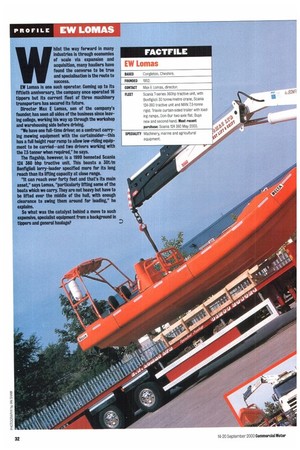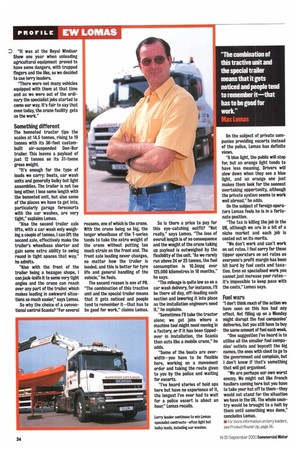Illif hilst the way forward in many industries is through economies
Page 34

Page 36

If you've noticed an error in this article please click here to report it so we can fix it.
of scale via expansion and acquisition, many hauliers have found the converse to be true and specialisation is the route to success. EW Lomas is one such operator. Coming up to its fiftieth anniversary, the company once operated 16 tippers but its current fleet of three machinery transporters has secured its future.
Director Max E Lomas, son of the company's founder, has seen all sides of the business since leaving college, working his way up through the workshop and warehousing side before driving.
"We have one full-time driver, on a contract carrying mowing equipment with the curtainsider—this has a full height rear ramp to allow low-riding equipment to be carried—and two drivers working with the 7.5 tonner when required," he says.
The flagship, however, is a 1999 bonneted Scania 124 360 bhp tractive unit. This boasts a 30t/m Bonfiglioli lorry-loader specified more for its long reach than its lifting capacity at close range.
"It can reach over forty feet and that's its main asset," says Lomas, "particularly lifting some of the boats which we carry. They are not heavy but have to be lifted over the middle of the hull, with enough clearance to swing them around for loading," he explains.
So what was the catalyst behind a move to such expensive, specialist equipment from a background in tippers and general haulage? "It was at the Royal Windsor Show one year when unloading agricultural equipment proved to have some dangers, with trapped fingers and the like, so we decided to use lorry loaders.
"There were not many vehicles equipped with them at that time and as we were out of the ordinary the specialist jobs started to come our way. It's fair to say that even today, the crane facility gets us the work."
Something different
The bonneted tractor tips the scales at 14.5 tonnes, rising to 19 tonnes with its 36-foot custombuilt air-suspended Don-Bur trailer. This leaves a payload of just 12 tonnes on its 31-tonne gross weight.
"It's enough for the type of loads we carry: boats, car wash units and generally bulky but light assemblies. The trailer is not too long either, I lose some length with the bonneted unit, but also some of the places we have to get into, particularly garage forecourts with the car washes, are very tight," explains Lomas.
"Also the second trailer axle lifts, with a car wash only weighing a couple of tonnes, I can lift the second axle, effectively make the trailer's wheelbase shorter and gain some extra ability to swing round in tight spaces that way," he admits.
"Also with the front of the trailer being a hexagon shape, I can jack-knife it to some very tight angles and the crane can reach over any part of the trailer, which makes loading in awkward situations so much easier," says Lomas.
So why the choice of a conventional control Scania? "For several
reasons, one of which is the crane. With the crane being so big, the longer wheelbase of the 1-series tends to take the extra weight of the crane without putting too much strain on the front end. The front axle loading never changes, no matter how the trailer is loaded, and this is better for tyre life and general handling of the vehicle," he feels.
The second reason is one of PR. "The combination of this tractive unit and the special trailer means that it gets noticed and people tend to remember it—that has to be good for work," claims Lomas. So is there a price to pay for this eye-catching outfit? "Not really," says Lomas. "The loss of overall length is of no consequence and the weight of the crane taking up payload is outweighed by the flexibility of the unit. "As we rarely run above 24 or 25 tonnes, the fuel consumption is 10.3mpg over 125,000 kilometres in 18 months," he says.
"The mileage is quite low as on a car wash delivery, for instance, I'll be there all day, off-loading each section and lowering it into place as the installation engineers need it," he explains.
"Sometimes I'll take the tractor alone; we get jobs where a machine tool might need moving in a factory, or if it has been tippedover in installation, the Scania then acts like a mobile crane," he adds.
"Some of the boats are overwidth—you have to be flexible here, working on a movement order and taking the route given to you by the police and waiting for escorts.
"I've heard stories of hold ups here but have no experience of it, the longest I've ever had to wait for a police escort is about an hour," Lomas recalls. On the subject of private companies providing escorts instead of the police, Lomas has definite views.
"A blue light, the public will stop for, but an orange light tends to have less meaning. Drivers will slow down when they see a blue light, and an orange one just makes them look for the soonest overtaking opportunity, although the private system seems to work well abroad," he adds.
On the subject of foreign operators Lomas feels he is in a fortunate position.
"The tax is killing the job in the UK, although we are in a bit of a niche market and each job is costed out on its merits.
"We don't work and can't work on set rates. I feel sorry for these tipper operators on set rates as everyone's profit margin has been hit hard by fuel costs and taxation. Even on specialised work you cannot just increase your rates— it's impossible to keep pace with the costs," Lomas says.
Fuel wars "I don't think much of the action we have seen on this has had any effect. Not filling up on a Monday might disrupt the fuel companies' deliveries, but you still have to buy the same amount of fuel each week.
'One suggestion I've heard is to utilise all the smaller fuel companies' outlets and boycott the big names, the ones with clout to go to the government and complain, but I don't know if that's something that will get organised.
"We are perhaps our own worst enemy. We might not like French hauliers coming here but you have to take your hat off to them—they would not stand for the situation we have in the UK. The whole country would be brought to a halt by them until something was done," concludes Lomas.
• For more information on lorry loaders, see Product Round-Up, page 36.








































































































